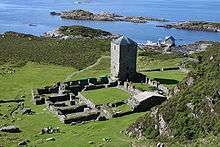Selje Abbey


Selje Abbey (Selje kloster) was a Benedictine monastery located on the island of Selja, formerly known as Selø, in the municipality of Selje, Sogn og Fjordane, Norway.[1]
History
The monastery was founded in about 1100 and was dedicated to Saint Alban (probably also to Saint Sunniva), the patron saint of the Norwegian Ancient Diocese of Bergen. At the time of the abbey's foundation the island of Selje was an important Christian site. It was the location of the original shrine of Saint Sunniva, who was believed to have been martyred here, and for that reason was a place of pilgrimage, and also the seat of a bishopric and a cathedral dedicated to Saint Michael, established about 1070. The bishop was instrumental in the establishment of the monastery here, and throughout its history there remained a strong connection between the abbey and the bishopric. However, the bishop moved to Bergen shortly after the monastery was founded, although the shrine of Saint Sunniva did not leave the island for Bergen until about 1170. After that time the monastery remained here alone.[2]
For the first two centuries of its existence it was a thriving and important centre, but a disastrous fire in 1305 gave the abbey a blow from which it never recovered. It is not clear to what extent the monastery was rebuilt. The small remaining community may have been wiped out by the Black Death in 1349, although there is a possibility that some sort of monastic community still existed on the island as late as 1451. If there was, it came to an end under Bishop Finnboge of Bergen (1461-1474), who dismissed the last abbot and took over the abbey estates for the use of the See of Bergen; an appeal to the Pope to divert them instead to the use of Nidarholm Abbey came to nothing.[3][4]

Site
The island site is spectacular, and because of the lack of later habitation and construction the ruins, not only of the abbey but of the old shrine of Saint Sunniva and of the cathedral, are extensive and extremely well preserved. The artist Bernt Tunold (1877– 1946) spent his childhood and some of his adult life on the island, and often painted the monastery ruins.[5]
References
- ↑ "Selje kloster". Norges klostre i middelalderen. Retrieved September 1, 2016.
- ↑ "Noregs fyrste bispesete". Selje Kloster. Retrieved September 1, 2016.
- ↑ "Klosteret". Selje Kloster. Retrieved September 1, 2016.
- ↑ Geir Bjarte Hjetland. "Tårnet på Selje kloster står no fram i ny prakt". nrk.no. Retrieved September 1, 2016.
- ↑ Wiig, Einar (1991). Bernt Tunold. Bergen: Nord4. p. 13. ISBN 82-7326-019-4.
Sources
- Norges klostre i middelalderen: Selje kloster (Norwegian)
External links
| Wikimedia Commons has media related to Selje kloster. |
Coordinates: 62°03′04″N 5°17′49″E / 62.05111°N 5.29694°E